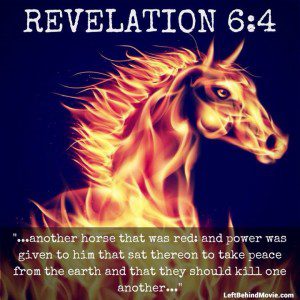And when he had opened the second seal, I heard the second beast say, Come and see.
And there went out another horse that was red: and power was given to him that sat thereon to take peace from the earth, and that they should kill one another: and there was given unto him a great sword.
— Revelation 6:3-4
Every Friday, Torie Rose DeGhett’s Political Notebook blog features her round-up of This Week in War, a collection of links related to “what happened and what’s been written in the world of war and military/security affairs.” It’s an impressively, depressingly wide-ranging list.
Last Friday’s list, for example, included news from the U.S., Nigeria, the Democratic Republic of the Congo, the Central African Republic, South Africa, Libya, Tunisia, Israel and the Palestinian territories, Iran, Syria, Saudi Arabia, Yemen, Iraq, Canada, Bahrain, Afghanistan, Ukraine, Russia, France, Germany, Austria, the UK, Guatemala, Argentina, Mauritania and Qatar.
 DeGhett’s “This Week in War” is never, ever short. There hasn’t yet been a Friday on which she was able to post only a brief apology because nothing happened that week in the world of war.
DeGhett’s “This Week in War” is never, ever short. There hasn’t yet been a Friday on which she was able to post only a brief apology because nothing happened that week in the world of war.
Meanwhile, Foreign Policy kicked off the new year with a helpful list of “10 Wars to Watch in 2015.” The article focuses only on the Top 10 because even Foreign Policy has a hard time keeping track of the full list of current conflicts.
Here’s an attempt at a more comprehensive list. That tallies 65 countries involved in ongoing conflicts as of Jan. 25, 2015 — with more than 600 different militias, guerrilla and separatist groups involved.
This quarry cries on havoc, but none of this suggests that 2015 is any worse — or any better — than most of the previous years of human history. Chris Hedges has estimated that “Of the past 3,400 years, humans have been entirely at peace for 268 of them, or just 8 percent of recorded history.”
That does not mean, of course, that everyone everywhere was at war during all of those 3,132 violent years. For most of that time, perhaps, most people in most places were not at war. Yet almost always, somewhere here on earth, some group of humans is fighting, and killing, and dying, in a war with some other group.
War has not been an aberration in human history. It has been almost a permanent fixture.
Which brings me back to that passage from the book of Revelation at the top of this post. Many Christians think of Revelation as a book about the Last Days or the End Times — a collection of predictions, prophesying future events.
But whatever you make of the rest of the book, I just can’t see how Revelation 6:3-4 can be read as a foretelling of the future. The rider on the red horse isn’t some dreaded figure whose arrival will come in the distant future. He lives here. He’s always lived here.
War isn’t the future. War is the present. We shouldn’t be waiting for the arrival of the rider on the red horse, we should be working to sent him packing.
















